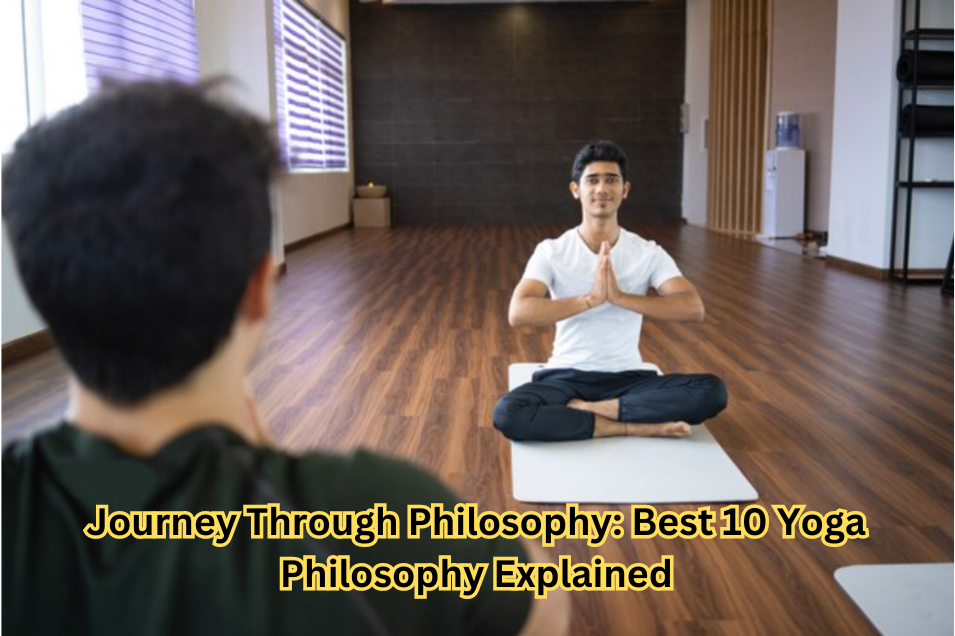Yoga is more than just a series of poses; it’s a philosophy that illuminates the path to a more complete existence. To better comprehend this age-old knowledge, we will dissect the ten pillars of yoga philosophy in an all-encompassing investigation.

A Comprehensive Guide to Yoga Philosophy
Yoga Philosophy Explained Finding balance in one’s mental, physical, and spiritual selves is the goal of yoga philosophy. These principles provide light on how to live a meaningful and satisfying life, and they have their origins in classic literature such as the Bhagavad Gita and Patanjali’s Yoga Sutras.
Yamas: Upholding Ethical Standards Yoga Philosophy Explained
Yoga Philosophy Explained The Yamas are rules of conduct that should govern how we engage with the world. They include the five tenets of nonviolence (Ahimsa), honesty (Satya), nonstealing (Asteya), moderation (Brahmacharya), and non-possessiveness (Aparigraha).
Niyamas: Insights from One’s Own Life Yoga Philosophy Explained
Yoga Philosophy Explained The niyamas emphasize introspection and self-control. These principles direct all of our actions and spiritual development: Saucha (purity), Santosha (satisfaction), Tapas (self-control), Svadhyaya (inner study), and Ishvara Pranidhana (submission to a higher force).
Physical Postures: Asanas Yoga Philosophy Explained
Yoga Philosophy Explained Asanas, or physical postures, are commonly associated with yoga but are only a small portion of the practice. They improve flexibility, balance, and strength to get the body ready for meditation.
Breath Control (Pranayama)
Practicing pranayama, or breath control, can help you manage your prana or life energy better. By doing targeted breathing exercises, one may learn to control and focus their energy, strengthening the bond between the mind and body.
Fifthly, Pratyahara, or Sensation Withdrawal
Practicing pratyahara involves bringing awareness inward by blocking out all outside stimuli. One can develop more self-awareness and concentration by distancing themselves from sensory stimuli.
Dharana: Mindfulness
Concentration, or dharana, is the technique of bringing awareness to a fixed space. Achieving mental steadiness and clarity is the goal of this focus, which is practiced before meditation.
Meditation (Dhyana)
Yoga Philosophy Explained Dhyana is the meditative state of mind, characterized by an unbroken stream of attention focused on an internal or external object. By entering a deep level of mindfulness and stillness, practitioners can rise beyond mental oscillations.

The Eighth Realm: Samadhi, or Oneness with God
Yoga Philosophy Explained: Attaining samadhi, or perfect oneness with the divine or highest awareness, is the pinnacle of yoga practice. In this ecstatic condition, the practitioner feels at one with reality.
Modern Yoga Philosophy and Its Significance
Yoga Philosophy Explained The concepts of yoga philosophy apply to the past, present, and future. The Yamas and Niyamas provide a moral framework for dealing with difficult ethical situations by outlining principles like compassion, honesty, and self-discipline.
In summary,
Yoga Philosophy Explained A well-rounded, meaningful existence is the goal of yoga philosophy, which is more than just an academic interest. When we make these concepts a part of our everyday lives, we start a path of self-transformation that goes beyond the physical poses and into the heart of yoga.
FAQ
Restorative yoga positions are gentle and caring postures meant to encourage relaxation and relieve tension in the body. They incorporate props like blankets, bolsters, and blocks to support the body in passive stretches, enabling deep relaxation and repair.
What are the Core Principles of Yoga Philosophy?
The Yamas and Niyamas, together with the Asanas, Pranayama, Pratyahara, Dharana, Dhyana, and Samadhi, are the ten pillars upon which the philosophy of yoga rests. These principles guide ethical behavior, personal observances, physical postures, breath control, and meditation phases.
How does Yoga Philosophy Enhance Daily Life?
Incorporating the teachings of yoga philosophy into one’s everyday life may improve one’s well-being in many ways, including more self-awareness, more ethical behavior, less stress, and a stronger bond between one’s mental, physical, and spiritual selves. Their advice is on how to live with awareness and direction.
Can Anyone Practice Yoga Philosophy?
In a word, yes. Age, gender, or physical ability are not barriers to practicing yoga philosophy. Its teachings are universally applicable and can serve as a personal and spiritual development roadmap.
Are the Principles of Yoga Philosophy Still Relevant Today?
I completely agree. In today’s world, the teachings of yoga philosophy are more important than ever. Ethical behavior, self-control, introspection, and a life well-lived are all addressed in these ageless teachings.
How Can I Incorporate Yoga Philosophy into My Daily Routine?
Mindfulness, introspection, deliberate breathing, making ethical decisions, and embracing the holistic qualities of yoga beyond physical postures are all part of incorporating yoga philosophy into your everyday routine.
Is Yoga Philosophy Connected to Religion?
The theory of yoga, albeit in older spiritual traditions, is universal. Regardless of their religious background, everyone may benefit from its emphasis on self-control, ethics, and spiritual development.
Can Yoga Philosophy Help with Stress and Mental Well-being?
Oh, without a doubt. Mindfulness, stress reduction, enhanced mental concentration, and emotional resilience are all aspects of mental health that may be improved by adhering to the tenets of yoga philosophy.
Is Yoga Philosophy Only About Meditation and Contemplation?
Yoga philosophy includes more than just meditation and contemplation; it also has physical postures, breathing exercises, self-discipline, and a holistic view of life.

